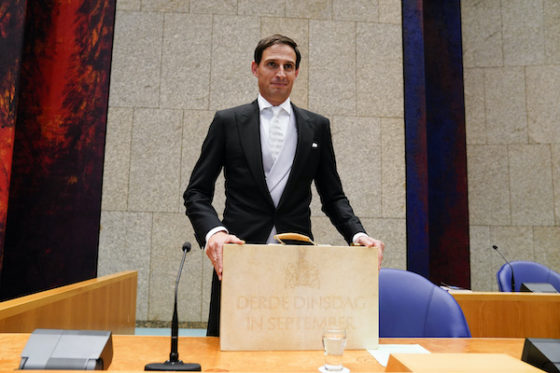Budget focus is on strengthening the economy, finance minister says


The government’s 2021 spending plans are focused on keeping the economy strong now and into the future, despite coronavirus, finance minister Wopke Hoekstra told MPs on Tuesday afternoon.
After almost six years of almost continuous economic growth, the economy has now been hit by the largest contraction since World War II, Hoekstra said. ‘And a large part of that still has to come’.
The government, he said, is pulling out all the stops to limit the damage, and the government has to offer confidence and stability. ‘We are asking people to adapt, but we are also offering a helping hand,’ Hoekstra said, referring to shifts in the economic landscape.
At the same time, work is proceeding on implementing two major government accords on pensions and climate, taxes are being cut and €500m is being invested in fighting organised crime, he said.
The new €20bn investment fund will focus on areas which experts have said need tackling in the Netherlands, he said, including innovation, research & development, the infrastructure and knowledge.
The aim, Hoekstra said, is to ensure the country’s earnings potential remains strong.
Softened the blow
The government’s macro-economic forecasting unit CPB said the support package has softened the blow and prevented a domino effect in the economy.
However, ‘an increase in bankruptcies and unemployment is inevitable when companies have to adapt to changing demand,’ director Pieter Hasekamp said.
‘This means that the effectiveness of the support policy will gradually decrease. It is, therefore, wise to carefully phase out the support package and focus more on adaptation and retraining.’
Discrimination
The CPB also said that the coronavirus crisis is having the greatest impact on vulnerable groups, including young people, the self-employed and migrants.
‘Coronavirus may also increase existing unequal opportunities in education and, thus, exacerbate income inequality in the long term,’ the agency said.
‘The real challenge is that of addressing the underlying vulnerabilities themselves… reducing the differences between permanent employment and flex work, combating ostensible self-employment and discrimination, reducing the differences in health levels and working conditions,’ the agency said.
‘Although this would come too late for the current crisis, it could ensure that society is more resilient by the time the next crisis hits.’
Thank you for donating to DutchNews.nl.
We could not provide the Dutch News service, and keep it free of charge, without the generous support of our readers. Your donations allow us to report on issues you tell us matter, and provide you with a summary of the most important Dutch news each day.
Make a donation